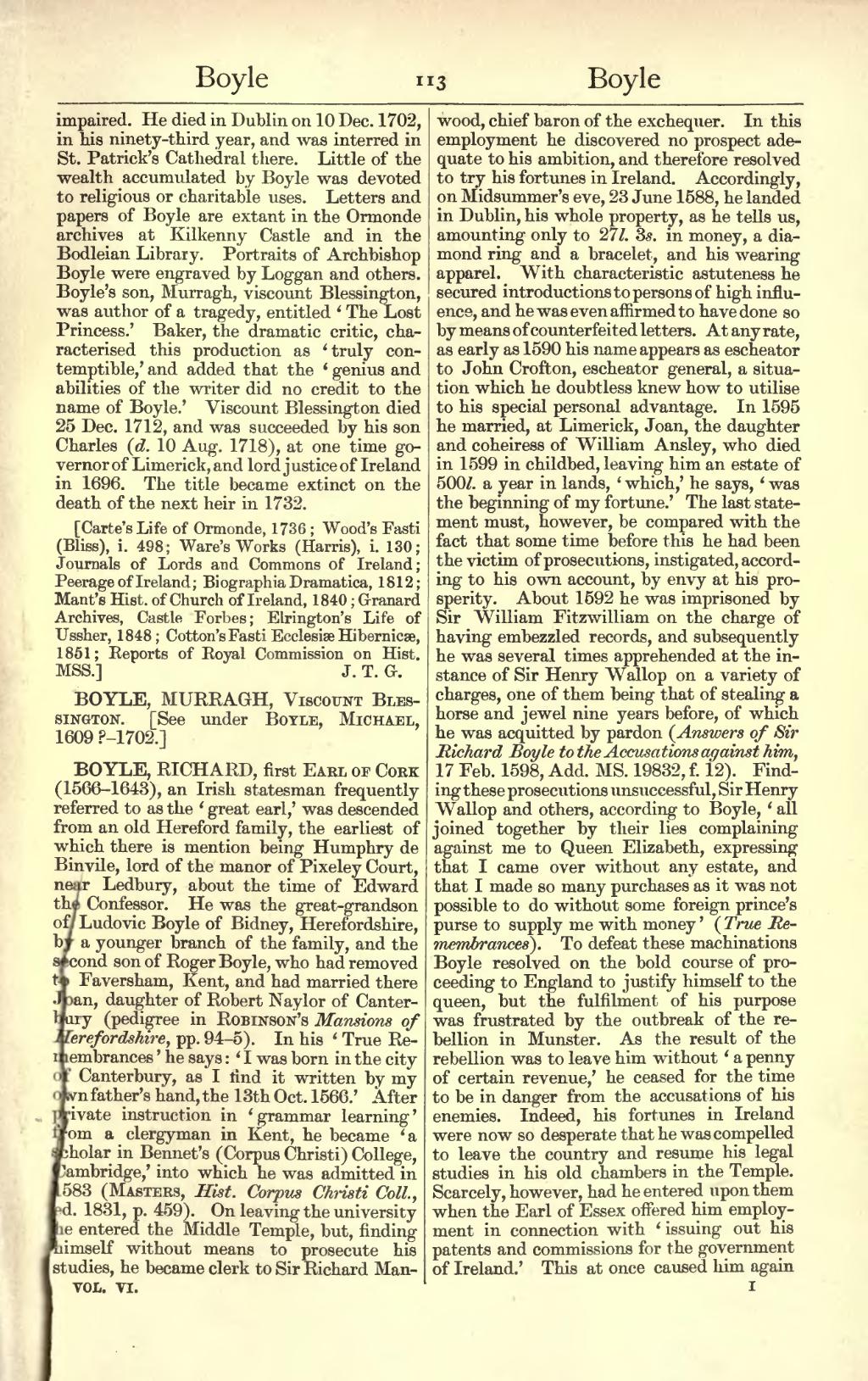impaired. He died in Dublin on 10 Dec. 1702, in his ninety-third year, and was interred in St. Patrick's Cathedral there. Little of the wealth accumulated by Boyle was devoted to religious or charitable uses. Letters and papers of Boyle are extant in the Ormonde archives at Kilkenny Castle and in the Bodleian Library. Portraits of Archbishop Boyle were engraved by Loggan and others. Boyle's son, Murragh, viscount Blessington, was author of a tragedy, entitled 'The Lost Princess.' Baker, the dramatic critic, characterised this production as 'truly contemptible,' and added that the 'genius and abilities of the writer did no credit to the name of Boyle.' Viscount Blessington died 25 Dec. 1712, and was succeeded by his son Charles (d. 10 Aug. 1718), at one time governor of Limerick, and lord justice of Ireland in 1696. The title became extinct on the death of the next heir in 1732.
[Carte's Life of Ormonde, 1736; Wood's Fasti (Bliss), i. 498; Ware's Works (Harris), i. 130; Journals of Lords and Commons of Ireland; Peerage of Ireland; Biographia Dramatica, 1812; Mant's Hist. of Church of Ireland, 1840; Granard Archives, Castle Forbes; Elrington's Life of Ussher, 1848; Cotton's Fasti Ecclesiæ Hibernicæ, 1851; Reports of Royal Commission on Hist. MSS.]
BOYLE, MURRAGH, Viscount Blessington. [See under Boyle, Michael (1609?–1702).]
BOYLE, RICHARD, first Earl of Cork (1566–1643), an Irish statesman frequently referred to as the 'great earl,' was descended from an old Hereford family, the earliest of which there is mention being Humphry de Binvile, lord of the manor of Pixeley Court, near Ledbury, about the time of Edward the Confessor. He was the great-grandson of Ludovic Boyle of Bidney, Herefordshire, by a younger branch of the family, and the second son of Roger Boyle, who had removed to Faversham, Kent, and had married there Joan, daughter of Robert Naylor of Canterbury (pedigree in Robinson's Mansions of Herefordshire, pp. 94-5). In his 'True Remembrances' he says: 'I was born in the city of Canterbury, as I find it written by my own father's hand, the 13th Oct. 1566.' After private instruction in 'grammar learning' from a clergyman in Kent, he became 'a scholar in Bennet's (Corpus Christi) College, Cambridge,' into which he was admitted in 1583 (Masters, Hist. Corpus Christi Coll., ed. 1831, p. 459). On leaving the university entered the Middle Temple, but, finding himself without means to prosecute his studies, he became clerk to Sir Richard Manwood, chief baron of the exchequer. In this employment he discovered no prospect adequate to his ambition, and therefore resolved to try his fortunes in Ireland. Accordingly, on Midsummer's eve, 23 June 1588, he landed in Dublin, his whole property, as he tells us, amounting only to 27l. 3s. in money, a diamond ring and a bracelet, and his wearing apparel. With characteristic astuteness he secured introductions to persons of high influence, and he was even affirmed to have done so by means of counterfeited letters. At any rate, as early as 1590 his name appears as escheator to John Crofton, escheator general, a situation which he doubtless knew how to utilise to his special personal advantage. In 1595 he married, at Limerick, Joan, the daughter and coheiress of William Ansley, who died in 1599 in childbed, leaving him an estate of 500l. a year in lands, 'which,' he says, 'was the beginning of my fortune.' The last statement must, however, be compared with the fact that some time before this he had been the victim of prosecutions, instigated, according to his own account, by envy at his prosperity. About 1592 he was imprisoned by Sir William Fitzwilliam on the charge of having embezzled records, and subsequently he was several times apprehended at the instance of Sir Henry Wallop on a variety of charges, one of them being that of stealing a horse and jewel nine years before, of which he was acquitted by pardon (Answers of Sir Richard Boyle to the Accusations against him, 17 Feb. 1598, Add. MS. 19832, f. 12). Finding these prosecutions unsuccessful, Sir Henry Wallop and others, according to Boyle, 'all joined together by their lies complaining against me to Queen Elizabeth, expressing that I came over without any estate, and that I made so many purchases as it was not possible to do without some foreign prince's purse to supply me with money' (True Remembrances}. To defeat these machinations Boyle resolved on the bold course of proceeding to England to justify himself to the queen, but the fulfilment of his purpose was frustrated by the outbreak of the rebellion in Munster. As the result of the rebellion was to leave him without 'a penny of certain revenue,' he ceased for the time to be in danger from the accusations of his enemies. Indeed, his fortunes in Ireland were now so desperate that he was compelled to leave the country and resume his legal studies in his old chambers in the Temple. Scarcely, however, had he entered upon them when the Earl of Essex offered him employment in connection with 'issuing out his patents and commissions for the government of Ireland.' This at once caused him again
